USB 3.0 Flash Drive Roundup
by Zach Throckmorton on July 29, 2011 11:15 AM EST- Posted in
- Storage
- Kingston
- USB 3.0
- Patriot
- Gadgets
- ADATA
- Super Talent
- Flash Drive
- Mushkin
Iometer sequential read performance benchmarks
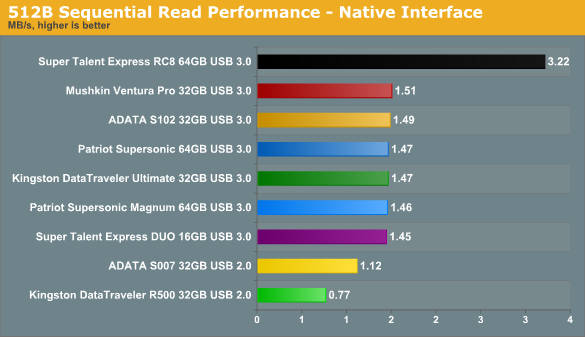
Similar to the small file writes, we see the USB 3.0 drives immediately out in front of the USB 2.0 drives, with Super Talent's RC8 way ahead of the group.
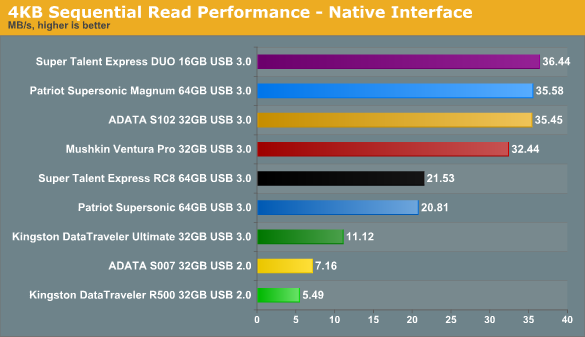
Interestingly, the Super Talent Express DUO moves to the vanguard.
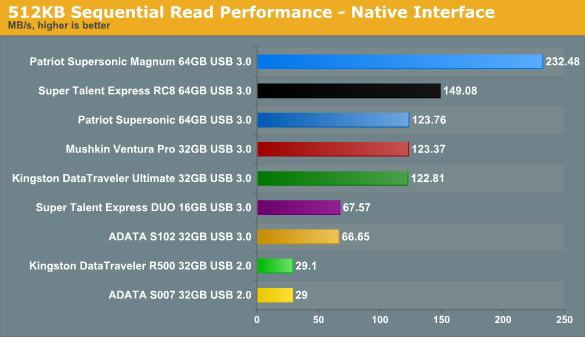
Again, similarly to the sequential write tests, the Patriot Supersonic Magnum pulls ahead with file sizes larger than 512KB.
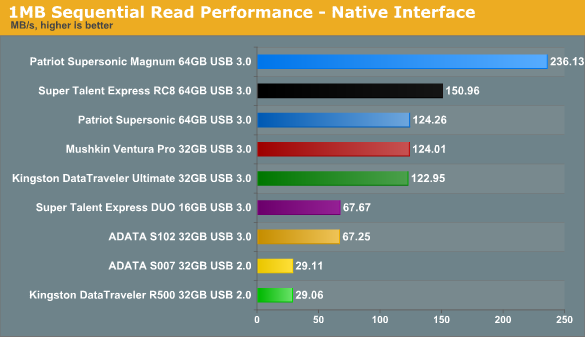
The same performance hierarchy as above is maintained with 1MB file size reads, though the two USB 2.0 drives switch positions (however, the difference between their performances remains negligible).
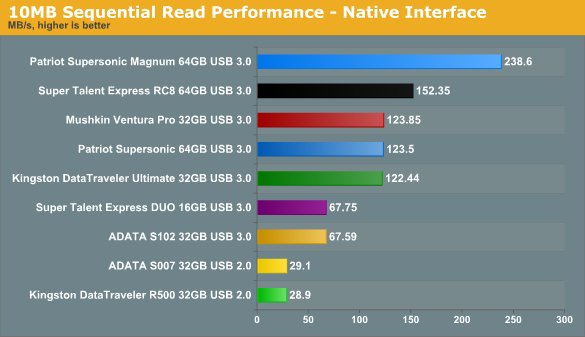
The pattern seems clear at this point.
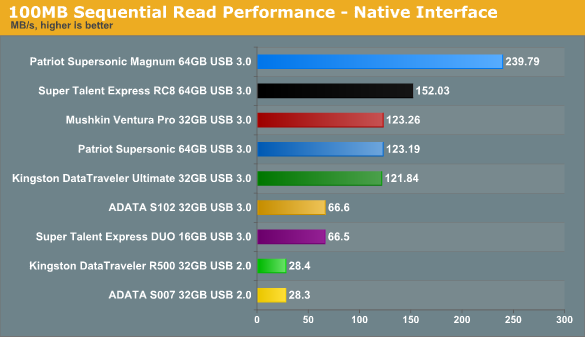
No surprises here. This hierarchy remains up to the 1GB file size limit of Iometer.
Synthetic benchmarks like the ones we've provided from Iometer are useful in evaluating storage products. They do not, however, paint an entirely clear picture. To better understand real-world performance, check the next page!










42 Comments
View All Comments
webmastir - Friday, July 29, 2011 - link
great write up, thanks!Kelemvor - Friday, July 29, 2011 - link
Absolutely. Hit on all the topics. Thanks. And they really aren't all that much more expensive.sbrown23 - Friday, July 29, 2011 - link
It was good, but I would like to have seen a testing of Linux distro running from the flash drive to get an idea of performance in that type of scenario. Load each up with a Linux distribution, boot each one and run a couple of benchmarks (heck even include boottime, etc.)pvdw - Thursday, December 1, 2011 - link
Definitely. The biggest use I get out of flash drives is for tech support, so I find random reads and writes sorely lacking. :(xygot - Friday, July 29, 2011 - link
This is a nice article for USB 3.0 using flash drive. However, I'm more interested in benchmark between USB 3.0 and eSata using external hard drive. Is there a benchmark on the way?This is what holding me for now if I need to upgrade to USB 3.0 or stay on eSata.
Zenthar - Friday, July 29, 2011 - link
I would like to see that as well. Given the $/GB of those thumbdrives, I would also be curious to see external USB 3.0 SSDs. Different needs will warrant different solutions.For backups for example (mostly sequential read/write), it would probably be more cost/efficient to get an external 2.5 HDD. If you want something to install and run applications from, then perhaps you will get better performance out of an external SSD.
The extra size of external HDD/SSD could be a bit annoying, but this usually translates to lower possibility of losing or washing the drive.
Gigantopithecus - Friday, July 29, 2011 - link
Hi xygot - I don't plan on adding a USB 3.0 vs eSATA performance comparison to the article. However, I can report that using a USB 3.0 HDD dock with a Western Digital WD20EARS on both ends of the transfer, for MP3 files, I get sustained writes of ~30MB/s and sustained reads of 50MB/s. Hope that helps!ckryan - Friday, July 29, 2011 - link
If you want to use a mechanical HDD, just stick with eSata. You won't be limited in any aspect of the HDD's performance. But I think there are some newer eSata and USB3 docks on the way, or possibly already on the market. Why not both?In my eSata II testing, I've found that a 7200rpm desktop drive has almost identical performance in an enclosure as it does with the Sata ports on the MB. As for USB3.0, I have two motherboards that support it, but no usb 3.0 devices. So I can't really speak to 3.0's performance except to say it's not like your HDD will run faster in a USB3 enclosure than it does in your computer.
As for the few USB3 external HDD, it's always been my preference to roll my own with an enclosure and my own HDD.
Sweeo - Saturday, July 30, 2011 - link
Well for me I would go for USB 3,how many comps/other divices got eSata ?USB 3 backword compatable
The thing is "other devises"
doylecc - Monday, August 1, 2011 - link
Adding eSATA is easy if you have a desktop. The adapter is inexpensive; this one costs less than $5 and provides two eSATA ports:http://www.newegg.com/Product/Product.aspx?Item=N8...
The eSata adapter socket mounts on an expansion card bracket that installs in any unused expansion card opening in the back of your computer.
Performance-wise, eSATA will allow you to extract the full performance from any mechanical hard drive. The faster SSDs need SATA III (6GB/sec) or USB 3 bandwidth for full performance.
Of course, if you have a laptop, you're limited to the built-in ports.